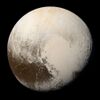Astronomy:471143 Dziewanna
 Dziewanna imaged by the Hubble Space Telescope in 2012 | |
| Discovery [1][2] | |
|---|---|
| Discovered by | A. Udalski S. S. Sheppard M. Kubiak C. Trujillo |
| Discovery site | Las Campanas Obs. |
| Discovery date | 13 March 2010 |
| Designations | |
| (471143) Dziewanna | |
| Pronunciation | /dʒiːˈwɑːnə/,[citation needed] Polish: [d͡ʑɛˈvanna] |
| Named after | Devana (Dziewanna) (Slavic goddess)[1] |
| 2010 EK139 | |
| Minor planet category | TNO [3] · SDO · 2:7 [4] |
| Adjectives | Dziewannian |
| Orbital characteristics [3] | |
| Epoch 23 March 2018 (JD 2458200.5) | |
| Uncertainty parameter 3 | |
| Observation arc | 13.16 yr (4,808 d) |
| |{{{apsis}}}|helion}} | 108.54 AU |
| |{{{apsis}}}|helion}} | 32.551 AU |
| 70.544 AU | |
| Eccentricity | 0.5386 |
| Orbital period | 592.51 yr (216,416 d) |
| Mean anomaly | 347.58° |
| Mean motion | 0° 0m 6.12s / day |
| Inclination | 29.444° |
| Longitude of ascending node | 346.15° |
| |{{{apsis}}}|helion}} | ≈ 22 October 2038[5] ±1 days |
| 284.25° | |
| Known satellites | none[6] |
| Physical characteristics | |
| Mean diameter | >504 km (occultation)[7] 470+35 −10 km[6] 697 km[8] |
| Rotation period | 7.07±0.05[9] |
| Geometric albedo | 0.10 (assumed)[8] 0.25+0.02−0.05[6] |
| Apparent magnitude | 19.6 (R)[4] 19.9[10] |
| Absolute magnitude (H) | 3.8±0.1[6] 3.89±0.04 (S)[9] 3.9[1][3] |
471143 Dziewanna (provisional designation 2010 EK139) is a trans-Neptunian object in the scattered disc, orbiting the Sun in the outermost region of the Solar System.
Dziewanna was discovered on 13 March 2010 by astronomers Andrzej Udalski, Scott Sheppard, Marcin Kubiak and Chad Trujillo at the Las Campanas Observatory in Chile.[1] Based on its absolute magnitude and assumed albedo, it is estimated to have a diameter of approximately 470 kilometers.[6] It was named after Devana (Polish form: Dziewanna), a Slavic goddess of the wilderness, forests and the hunt,[1] in honor of the fact that it was discovered during the Polish OGLE project of Warsaw University, which was led by Udalski.[11]
Distance


Dziewanna orbits the Sun at a distance of 32.6 to 108.3 AU once every 591 years and 4 months (215,992 days). Its orbit has an eccentricity of 0.54 and an inclination of 29° with respect to the ecliptic.[3] It is currently 39.1 AU from the Sun and will reach perihelion in 2038.[3][10] A ten-million-year integration of the orbit shows that this object is in a 2:7 resonance with Neptune.[4]
A precovery image was taken by the Near-Earth Asteroid Tracking at Palomar Observatory in 2002. This extends Dziewanna's observation arc to 8 years prior to discovery. It has since been observed 143 times over 6 oppositions and has an orbit quality of 1.[1]
Physical properties
In 2010, the thermal radiation of Dziewanna was observed by the Herschel Space Telescope, which allowed astronomers to estimate its diameter at about 470 km (290 mi).[6] A stellar occultation by Dziewanna was observed on 17 May 2019, yielding a single-chord diameter of 504 km (313 mi).[7]
A rotational lightcurve was obtained from photometric observations at the discovering observatory, with the 2.5-meter Irénée du Pont Telescope, and published in May 2013. The lightcurve shows that the rotation period is 7.07±0.05 hours; the variation in brightness is of magnitude 0.12 ({{{1}}}).[9]
Observations by American astronomer Michael Brown at the Keck telescope in March 2012 failed to find a satellite. There is therefore currently no means to determine Dziewanna's mass.[6]
See also
References
- ↑ 1.0 1.1 1.2 1.3 1.4 1.5 "471143 Dziewanna (2010 EK139)". Minor Planet Center. https://www.minorplanetcenter.net/db_search/show_object?object_id=471143.
- ↑ "MPEC 2010-G49 : 2010 EK139". IAU Minor Planet Center. 2010-04-08. http://www.minorplanetcenter.org/mpec/K10/K10G49.html.
- ↑ 3.0 3.1 3.2 3.3 3.4 "JPL Small-Body Database Browser: 471143 Dziewanna (2010 EK139)". Jet Propulsion Laboratory. https://ssd.jpl.nasa.gov/sbdb.cgi?sstr=2471143.
- ↑ 4.0 4.1 4.2 Marc W. Buie. "Orbit Fit and Astrometric record for 10EK139". SwRI (Space Science Department). http://www.boulder.swri.edu/~buie/kbo/astrom/10EK139.html.
- ↑ JPL Horizons Observer Location: @sun (Perihelion occurs when deldot changes from negative to positive. Uncertainty in time of perihelion is 3-sigma.)
- ↑ 6.0 6.1 6.2 6.3 6.4 6.5 6.6 Pál, A.; Kiss, C.; Müller, T. G.; Santos-Sanz, P.; Vilenius, E.; Szalai, N. et al. (May 2012). ""TNOs are Cool": A survey of the trans-Neptunian region. VII. Size and surface characteristics of (90377) Sedna and 2010 EK139". Astronomy and Astrophysics 541: 4. doi:10.1051/0004-6361/201218874. Bibcode: 2012A&A...541L...6P.
- ↑ 7.0 7.1 "TNO Results". ERC Lucky Star Project. Laboratoire d'Etudes Spatiales et d'Instrumentation en Astrophysique (LESIA). https://lesia.obspm.fr/lucky-star/results.php.
- ↑ 8.0 8.1 "LCDB Data for (471143)". Asteroid Lightcurve Database (LCDB). http://www.minorplanet.info/PHP/generateOneAsteroidInfo.php?AstInfo=471143%7C.
- ↑ 9.0 9.1 9.2 Benecchi, Susan D.; Sheppard, Scott S. (May 2013). "Light Curves of 32 Large Transneptunian Objects". The Astronomical Journal 145 (5): 19. doi:10.1088/0004-6256/145/5/124. Bibcode: 2013AJ....145..124B.
- ↑ 10.0 10.1 "AstDys 2010EK139 Ephemerides". Department of Mathematics, University of Pisa, Italy. https://newton.spacedys.com/astdys/index.php?pc=1.1.3.0&n=2010EK139.
- ↑ Urbański, Krzysztof (4 May 2010). "Układ Słoneczny coraz większy". Rzeczpospolita (Warsaw: Gremi Media SA). http://www.rp.pl/artykul/470516_Uklad_Sloneczny_coraz_wiekszy.html. Retrieved 4 May 2010. (Translation pl->en)
- ↑ Lowe, Andrew. "(471143) 2010 EK139 Precovery Images". http://andrew-lowe.ca/2010ek139.htm.
External links
- MPEC 2010 G50 : 2010 EK139, Minor Planet Electronic Circular, issued on 8 April 2010
- OCKS: OGLE Carnegie Kuiper belt Survey (OCKS is a Southern sky survey searching for Kuiper-belt objects and dwarf planets)
- List Of Centaurs and Scattered-Disk Objects, Minor Planet Center
- 471143 Dziewanna at the JPL Small-Body Database
 |



